THUNDER BAY — Two contributors to a new publication about addictions and substance use by the Thunder Bay District Health Unit say they believe it will make a difference.
The health unit has released a handbook called “Parents Like Us.” It is primarily aimed at providing information and guidance to parents and caregivers of younger people (up to age 30 or so) who are dealing with substance use, but public health officials say its information can be applied much more broadly.
The health unit held an official launch on Wednesday.
“This has been a really long process, but we're so excited that it's here,” said Ronda Mackie, a harm reduction worker and one of the contributors to Parents Like Us.
“I've already had a lot of people coming to me asking me about this resource.”
Mackie, who has also been through caring for a child who was using substances, said it’s something that could have helped her.
“I sort of thought that the way to help was to put a heavy hand, and I don't think that anymore,” she said.
“I definitely have changed my perspective on what needs to happen, and I think connection and love is what helps people, not the heavy hand or, you know, that tough love.”
Clarence Fisher, who has lived experienced with addictions and now works to help those who do, said the book is a “team effort” and an important resource.
“If we're going to continue to fight the good fight in regards to addictions and recovery, we have to have a team effort like that,” he said.
That, he said, is underscored by the city not having “the best record when it comes to drug abuse.”
While Parents Like Us is aimed at helping caregivers of those using all kinds of substances, opioids in particular area a concern in the region.
Thunder Bay again had the highest rate of opioid overdose-related deaths in Ontario, according to statistics from the Office of the Chief Coroner.
Also, based on 2023 statistics provided by the health unit from Public Health Ontario, the Thunder Bay district also has significantly higher rates of alcohol-related emergency department visits and hospitalizations than the provincial average.
“It's important that we, as individuals, organizations and agencies come together because it's a very prevalent issue,” Fisher said.
“The types of services and responses to those issues has been inadequate in the past, and the drug crisis, and the types of drugs we're dealing with today, are exponentially more dangerous so it's important that we do this type of work together as a community.”
He echoed the new handbook’s message that there is support and help available.
“For somebody who finds this resource, I'd hope that they initially know that they're not alone, that there's other people who had this experience, that addictions has no boundaries,” he said.
“I'd like to acknowledge the ones that are out there, the ones that are still living with an active addiction, and I’d just like them to know that it’s a beautiful life on this side,” Fisher continued.
“Your families and your loved ones and people like myself are waiting for you.”
-With files from Rylee Cohen
